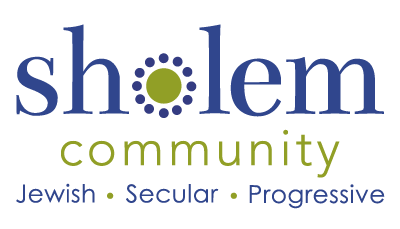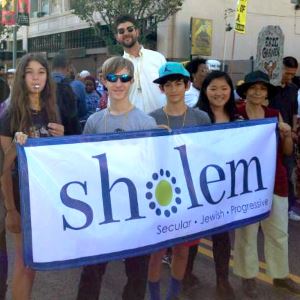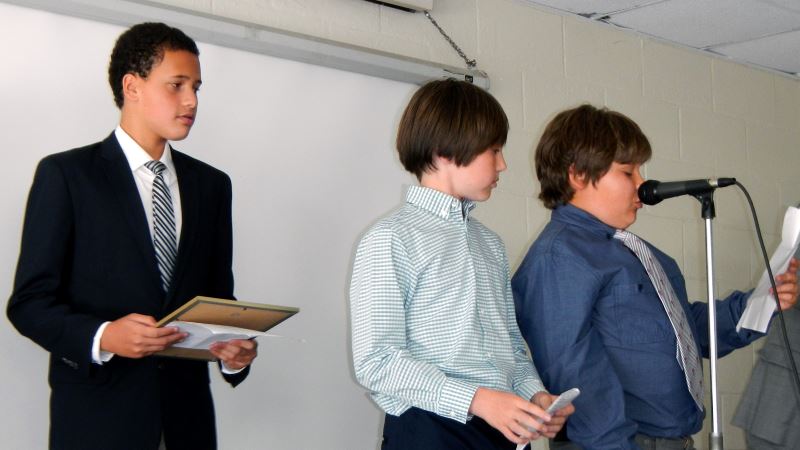
Overview and Background
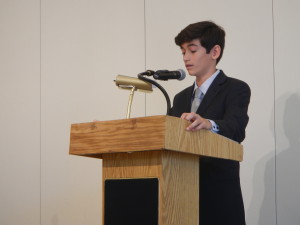 Jewish folk traditions recognizing the maturation of adolescents have evolved continuously over many centuries. Sholem’s secular bar/bas mitsve observances meet the needs of families who honor their heritage and define their Jewish identity as cultural, historical, or ethnic, rather than religious.
Jewish folk traditions recognizing the maturation of adolescents have evolved continuously over many centuries. Sholem’s secular bar/bas mitsve observances meet the needs of families who honor their heritage and define their Jewish identity as cultural, historical, or ethnic, rather than religious.
In the Sholem Community, eligible students in the Sunday School choose a topic for in-depth research or for significant thought. The choices reflect the individual’s areas of interest…those aspects of Jewish heritage and identity that are most meaningful at this point in the young person’s life. Each individual chooses both the topic and the medium of presentation: spoken essay, dance, music, graphic art, drama, audio-visual statement, etc.
Fundamental to our concept is our definition of the bar/bas mitsve as a young person who has attained a degree of understanding of the meaning of his or her Jewish heritage and identity, usually, though not exclusively, from the secular point of view. Students are encouraged to examine their ideas and feelings about their Jewish heritage and identities and their place within the Sholem Community, and to share their findings with the Community.
Sholem celebrates its bar/bas mitsves by making our ceremonies community events.The individual is celebrated as part of a group. Read more about our approach.
The Process
The Sholem School provides the framework for the preparatory process. The bar/bas mitsve candidate chooses a topic for in-depth research and/or significant thought. With the advisor, the student determines the medium of a presentation that is generally around 20 minutes in length. These choices reflect the individual’s interests and aspects of Jewish heritage and identity that are most meaningful at this point in the person’s life.
Students are assigned deadlines, and are expected to adhere to them. The process is often a transforming experience, far more profound than is customarily required for school projects and reports. In developing their concepts and planning their presentations, they are encouraged to be completely honest, to rely on their own thoughts and feelings rather than attempting to conform to what they believe their families and friends may expect of them. In addition to their own individual efforts, they may also work cooperatively with the other students, offering each other constructive criticism and suggestions..
The Celebrants
Students automatically qualify to participate in the process if they have attended Sholem School continuously from grade Alef through Hey, or a total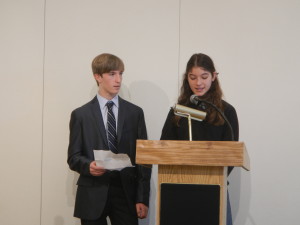 of eight years if attendance has been intermittent. The minimum, non-automatic eligibility requirements are: two years as a Sholem student in grades Giml, Daled, and/or Hey, and the approval of the advisor(s). Candidates must be in Year 2 of the Hey class (which will usually be eighth grade). Students in Hey Year 1 are not eligible for the Sholem bar/bas program. Previous Jewish education may be considered by the advisor(s) in establishing eligibility.
of eight years if attendance has been intermittent. The minimum, non-automatic eligibility requirements are: two years as a Sholem student in grades Giml, Daled, and/or Hey, and the approval of the advisor(s). Candidates must be in Year 2 of the Hey class (which will usually be eighth grade). Students in Hey Year 1 are not eligible for the Sholem bar/bas program. Previous Jewish education may be considered by the advisor(s) in establishing eligibility.
In choosing to become bar/bas mitsve, Sholem students must make a commitment to the process. To participate successfully, they must be willing and able to give the process a priority in their schedules.
The Advisor(s)
Sholem appoints the mentors to the bar/bas mitsve process, ideally, certified vegvayzer/Leaders. Facilitators from Sholem’s bar/bas mitsve committee are available to parents throughout the process as facilitators.The advisor(s) work closely with the students at each stage of the process, helping them to make their own choices and suggesting approaches, but at no point dictating any course of thought or action. In consultation with the students and their parents, the advisor(s) set reasonable deadlines for such key stages in the process as: topic selection, proposed outline of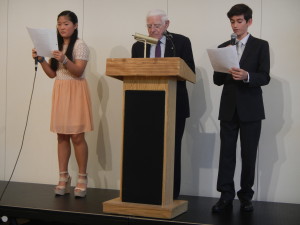 presentation, first, and subsequent drafts.
presentation, first, and subsequent drafts.
The advisor(s):
- consult with the parents on all matters relating to the celebration events;
- officiate at the celebration(s), providing an appropriate setting for the presentations to be made by the celebrants.
The Parents
The role of the parents is threefold: to provide the student with the structure, practical assistance, and encouragement which enables the student to master this challenge; to plan aspects of the ceremony and the celebration; and to select the venue.
In fulfilling their role, it is important for parents to bear in mind the unique nature of this process and culminating event. The Sholem Community stresses the learning process of the entire family leading to the bar/bas mitsve ceremony. The development of the celebrants’ understanding takes precedence over their “performance” and in turn, over the certificates which they may be awarded, and gifts they may expect.
Preparation for participation in the bar/bas mitsve process begins in the year preceding a student’s eligibility.
Parents organizing bar/bas mitsve events are asked to submit two forms:
- A confidential questionnaire that allows for families to be grouped together.
- Confirmation that you have read and agree to the guidelines.
Tzedakah/Tsedoke (social justice) Project
Sholem bar/basmitsve candidates are required to participate in a tzedakah/tsedoke project involving community service or social action. The intent is for the families and the bar/basmitsve candidates to work together to put our values into action. Students work with their parents to coordinate activities and to involve the larger Sholem Community. The students are expected to devote at least ten hours to community service or social action.
The word tzedakah in Hebrew (tsedoke in Yiddish) come from the same root, tzedek, meaning justice or righteousness.
No later than six months prior to the bar/bas mitsve ceremony, students are expected to select a project that has meaning for them and is consistent with the goals of the Sholem Community—to help build a besere un shenere velt, a better and more beautiful world. Students may do volunteer work or may engage in a social action project designed to foster meaningful change. To involve families in this process, the parents of the bar/bas mitsve students for any given year will select coordinators to assist with ideas and to help the students make arrangements. We encourage students to select projects for collective action, but that does not preclude students from making individual choices and commitments. With the assistance of their mentors, they may talk about their experience during their presentations. Sholem hopes students will select projects they feel passionate about to ensure a positive experience and to encourage a life-long commitment to social justice.
